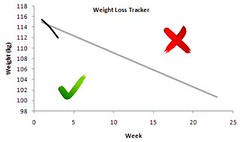This plan will involve 2 primary components:
1. An increase in physical activity
2. A nutritional program that promotes weight loss
| weight loss tracker (Photo credit: The Shed1) |
The second point is also crucial, because any weight-loss plan must include healthy eating, not just simply less eating. Although people wanting to lose weight would love to lose it all very quickly, when it comes to weight loss, slow and steady wins the race.
How much weight loss is reasonable over the course of a month?
A reasonable weight-loss plan would see you shed one to two pounds per week, or an average of four to eights pounds per month. Excessive weight loss at the start of extreme dieting programs is usually due to fluid loss, not fat. Just remember that you did not put on the extra weight in one week, so do not expect it to come off in one week either!
Burn more calories than you eat
Regardless of what path you choose to lose a few pounds, a basic truth exists – if you want to lose weight, the amount of calories you eat must be less than the number of calories you burn. This is why physical activity is a vital part of any weight-loss plan. (See our recent blog post on this important topic: http://www.newholisticliving.com/1/post/2013/09/the-weight-loss-secret-that-doesnt-exist-part-1.html)
Every pound of fat equals approximately 3500 calories. Therefore, a simple rule of thumb is that in order to lose a pound of fat per week, you must consume 3500 less calories than you burn for that week.
How many calories should you eat and drink in a day?
The number of calories you should consume in a day will depend on several factors such as gender, height, age, etc., so consult with your physician to determine what is right for you.
However, once you know what that number is, that is your maximum daily amount.
Therefore, getting the calories from the correct food sources becomes important.
| Eat less do more (Photo credit: Wikipedia) |
1. Keep a journal of what you have eaten
This can be tedious but, if done properly, it can monitor whether or not you are achieving your goal. It can be easy to overeat without even realizing it. A journal will help to keep you honest with yourself.
2. Make a meal plan
Knowing what you will eat and when you will eat that day, reduces the chances of eating unhealthy, processed foods when you just do not know what to make for dinner. It is like going shopping without a grocery list – you will probably pick up things you do not need. The same applies here – without a meal plan, you will eat things you do not need.
3. Eat sensible foods
What does this mean? You have probably heard the terms, "protein," "high carbs," and "low carbs." What's what? Carbs (carbohydrates) have come under attack in recent years. The truth is that they are a good source of energy, if you consume the correct types of carbs.
Processed foods contain simple carbohydrates with a high glycemic index. This means that when they are consumed, your blood sugar rises quickly, but then drops quickly as the rush passes. As your blood sugar drops, hunger ensues again and this is when people overeat.
On the other hand, eating complex carbohydrates with a lower glycemic index such as oatmeal, whole grain bread, and fresh fruit, will give you energy and keep you feeling satisfied for a longer time.
Combining this with other high-protein foods such as nuts and lean meats, will provide you with a nutritious long-lasting energy source.
In summary, when it comes to losing weight and nutrition, take a common-sense approach. Burn more calories than you take in, feed your body high-quality foods, and you will begin to see the rewards over time.
Check out recent posts on our health blog for more tips on eating well and exercising smart: http://www.newholisticliving.com/blog.html



No comments:
Post a Comment